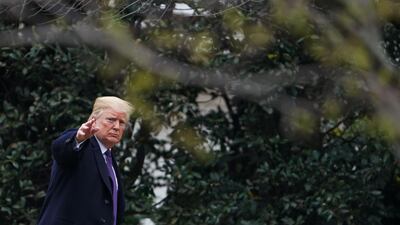The US President Donald Trump’s announcement of his intention to impose a significant tariff upon steel imports will surely initiate a trade war.
After all, it is not an isolated or arbitrary policy: it comes in the wake of imposing tariffs upon washing machine imports. And when the Jean Claude Juncker, the President of the European Commission, indicated that the European Union would respond in kind, Mr Trump doubled down by threatening to impose tariffs on imports of European vehicles. This cycle of economic self-flagellation actually offers the Arabian Gulf countries an opportunity to revise their own trade policies to further cement their position as constructive members of the global community.
Before I explain how the Gulf countries can take advantage of the situation, it is worth expanding upon why I refer to the imposition of trade barriers as "self-flagellation" - in this case meaning a country hurting itself.
Every day, 99 per cent or more of the goods and services that you consume are produced by someone else. This is because specialisation is the key to economic prosperity: if you had to produce your own food, your own clothes and your own medicines, then you would have to work 20 hours a day just to stay alive. In fact, civilization is defined by the creation of an agricultural surplus that allows people to specialise in food production, so that others can specialise in producing other goods, which they can trade for food.
Specialisation allows the economic pie to grow hugely, because it lets people focus on doing what they are good at doing, and it allows people to exploit economies of scale. Along with technological progress, specialisation and global trade is the reason why income today is hundreds of times larger than it was in the Middle Ages.
Suppose that during your next trip to the grocery store, where you intend to exchange the earnings from your specialized labor for food, you decided to impose a 25 per cent tariff on everything you buy. So, when the store charges you $4 for a chicken, you pay $5. If that seems ridiculous and entirely counterproductive, then you understand why tariffs constitute a form of self-injury.
In the case of goods that you can produce at home rather than buying at the store, such as sandwiches, the tariff will wastefully push you toward more home production and fewer purchases from the store. Your overall wellbeing is certainly lower. At the level of a country, there are two reasons why this effect leads to the imposition of tariffs.
_______________
Read more:
Business Extra Podcast: How the media shapes investor perceptions
Economics 101: Stop trying to get rich quickly from investments
_______________
First, countries are not one person: when Mr Trump imposes tariffs on steel, it helps domestic steel manufacturers, even if the domestic economy as a whole shrinks, as steel prices rise and resources are wastefully allocated to domestic steel production. This ensures domestic steel manufacturers secure a larger slice of a shrinking pie.
Second, it helps people who have steel production skills but who have been laid off by the recent shift toward steel imports. Skills take time to build and, if you are unlucky, you could end up investing in skills that are not in demand. For these people, tariffs can help shift the economic forces back in their favour.
Taken together, these two factors mean that tariffs cause a small segment of society to gain at the expense of society as a whole. One of the flaws of modern political systems is that governments can be manipulated into adopting such policies, because lobby groups are good at articulating the interests of small groups, whereas large groups - including society as a whole - are too disorganised to petition government. In contrast, going back to the grocery store example, an individual is one person and so there are no problems of competing interests when you impose a tariff on your own purchases.
The World Trade Organisation exists to try to prevent the flaws of modern government from undermining the global economy, but Trump’s scorn for multilateralism has reinitiated the cycle of economic lunacy.
Are there any opportunities for the Gulf countries? At present, they impose a variety of customs taxes on imported goods. The Gulf countries should consider eliminating them permanently since, for the most part, their only benefit is modest tax revenues. Unlike countries such as the US and Germany, the Gulf countries don’t actually produce most of the goods that they import, meaning that there is no domestic industry or lobby group that is helped by tariffs.
By eliminating such tariffs, the Gulf countries can secure lower prices for their residents. Moreover, they can use such a policy to bargain for lower tariffs on the goods that the Gulf countries do export, including petrochemicals and aviation. The resulting boost to the economy would compensate for the small quantities of foregone customs tax revenues.
In addition to the economic benefits, there would be geo-political ones, too.
Flying the flag of free trade and multilateralism would be especially advantageous when other countries are undermining the global order, and it would reinforce the view that the Gulf countries are reliable partners and positive members of the global community.
Omar Al-Ubaydli (@omareconomics) is a researcher at Derasat, Bahrain.


